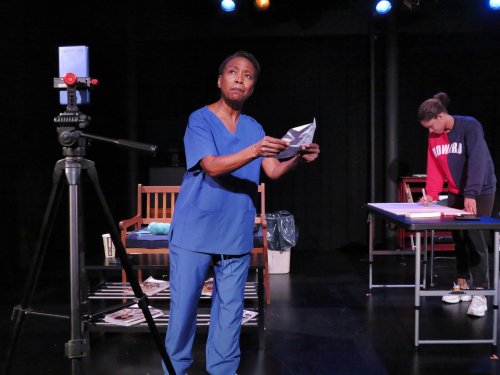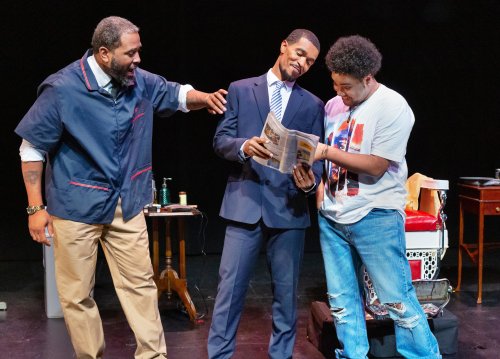Our Voices, Our Time: One-Act Play Festival
Three short plays reveal many facets of Black America in this production from the venerable and historic Negro Ensemble Company.

Sandra F. Williams and Alyssa Carter in a scene from Cynthia Grace Robinson’s “What If…?,” part of “Our Voices, Our Time: One-Act Play Festival” at the Cherry Lane Studio (Photo credit: Jonathan Slaff)
[avatar user=”Joel Benjamin” size=”96″ align=”left”] Joel Benjamin, Critic[/avatar]
The venerable, historic Negro Ensemble Company is presenting an intriguing program at the equally venerable, historic Cherry Lane Theatre: Our Voices, Our Time: One-Act Play Festival.
The three short plays, all insightful in very individual ways, reveal the ins and outs of relationships while also dealing with contemporary issues.
What If…?, a two-hander by Cynthia Grace Robinson, is a series of ever-more-involving conversations between Mommy (a superb Sandra F. Williams), snowbound in upstate New York, and her daughter Kiandra (a fine Alyssa Carter, who proves her versatility later in the program) in her dorm room at Howard University in D.C. (very basic but functional scenery for all three plays by Patrice Andrew Davidson).
Kiandra has just learned that her roommate/best friend, Jade, taken into police custody after a minor scuffle outside a McDonald’s, has died, enraging not just Kiandra, but many students who decide to protest against police brutality. (It goes without saying that Jade is Black.)
Mommy, frustrated by her inability to get to her daughter, tries desperately over a series of video calls to persuade Kiandra to avoid any such confrontation—to no avail.
Kiandra gets supercharged to demonstrate, makes “fuck the police” posters and weeps angry tears over losing her friend, while Mommy tears herself apart in frustration.
Robinson’s words are finely tuned, revealing this parent/child relationship in subtle detail, helped by the two actors’ interpretations under Daniel Carlton’s astute direction. What if….? does become too preachy towards the end, tempered by a touching denouement.

Alyssa Carter and Alleyne Owen in a scene from Mona R. Washington’s “I Don’t Do That,” part of “Our Voices, Our Time: One-Act Play Festival” at the Cherry Lane Studio (Photo credit: Jonathan Slaff)
Mona R. Washington’s I Don’t Do That is a wry, amusing look at the cultural gap between American Black women and their Nigerian lovers. The play takes the form of one couple serving as commentators and the other as subjects we observe as they squabble and make love.
The title is derived from the abhorrence Simon (a sexy, solid Alleyne Owen) has when he discovers his fiancée, Norah (Carter, displaying more of her acting chops) is menstruating as he attempts sex. This results in his first “I don’t do that” in a play full of them uttered by Simon and his pal Ade (a loveable, yet macho Bernard Scudder), boyfriend of the sassy, unpredictable Mary Catherine (Khadija Bangour in a standout performance).
Staged with an easygoing sense of humor by director Patronia Paley, I Don’t Do That jumps between the two couples. The main theme is Nigerian men don’t like their women to be as voluble and intransigent as American Black women. These two vibrant ladies who think nothing of speaking up, even cursing, at their shocked—but hypocritical—Africa lovers, give as good as they get and pretty much wind up on top.
Washington clearly knows her characters’ idiosyncracies and doesn’t shy away from ethnic slurs as the sparks fly. It is mostly animal magnetism that keeps each couple going even as the women sass the men to distraction. The acting has an easygoing charm and the Nigerian accents seemed authentic.

Benjamin Row, Alton Ray and Abel Garcia in a scene from Cris Eli Blak’s “Clipper Cut Nation,” part of “Our Voices, Our Time: One-Act Play Festival” at the Cherry Lane Studio (Photo credit: Jonathan Slaff)
The final play is Clipper Cut Nation by Cris Eli Blak and directed by Ralph McCain. It takes place in that home-away-from-home in many Black communities, the local Barber Shop, this one owned by the avuncular Moe (Benjamin Row, totally convincing as the ruler of his little patch). A young man, Jackie (a wide-eyed Abel Garcia), a new worker, arrives late for work, but is properly chastened by his good-natured boss.
Into this informal club comes the successful Prentice (a wonderfully sleazy, dapper Alton Ray) who grouped up in the neighborhood and is now on the brink of major success.
Just as Clipper Cut Nation appears to be a comfortably quotidian bit of fluff, in walks Sanford (a powerful Steven P. Jacoby) who explodes when he sees Prentice. Their tragic history brings the play close to violence, tempered by Moe stepping in as referee. Prentice has profitably hidden a dark past, a past that caused great suffering for Sanford. There is no way to resolve their conflict, but the process, the conversation make for great theater.
The costumes, from the African shirts in I Don’t Do That to Prentice’s sleek suit in Clipper Cut Nation and the nurse’s scrubs in What If….? are arranged by costume designer Rhonda Lucas. (An official hospital ID tag might have added more authenticity to the scrubs.)
The Negro Ensemble Company (Karen Brown, Executive Director) is clearly alive and well.
Our Voices, Our Time: One-Act Play Festival (through November 6, 2022)
Negro Ensemble Company, Inc. and Penn Live Arts
Cherry Lane Theatre
Cherry Lane Studio, 38 Commerce Street, in Manhattan
For tickets, call 347-613-8609 or visit http://www.necinc.org
Running time, two hours and 30 minutes including one intermission






Leave a comment